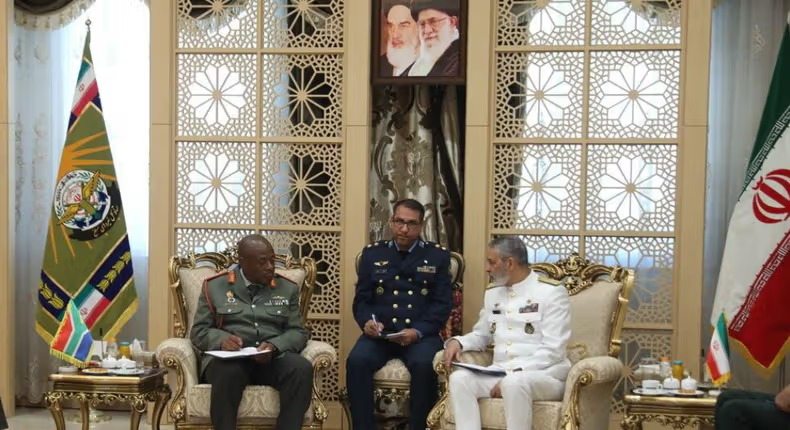South African general’s unapproved visit to Iran may signal complex US relations

- South Africa’s army chief, General Rudzani Maphwanya, made an unapproved visit to Iran, pledging military and political support.
- The South African government disapproved of the visit, asserting it was unauthorized and did not align with official policy.
- Government officials described the action as unfortunate and announced intentions to address its implications with the general.
The move, which did not receive government backing, has drawn sharp criticism from members of South Africa’s governing coalition, who described the visit as “reckless grandstanding.”
The row comes as South Africa navigates tense relations with the US, which has taken exception to the country’s ties with Iran, Russia, and its strong affiliation with BRICS.
According to Iranian media outlet WANA News Agency, Iran’s Chief of Staff, Major General Mousavi, condemned what he called the crimes of the Israeli regime in the region—particularly genocide in Gaza—and praised South Africa’s decision to file and pursue a genocide case against Israel at the International Criminal Court.
General Maphwanya noted that the two countries shared common goals and always stood “alongside the oppressed and defenceless people of the world,” according to the Iranian publication Tehran Times.
He also criticised Israel over the ongoing war in Gaza, reiterating support for the Palestinian people and telling officials his visit “carries a political message” from Ramaphosa’s administration as per The BBC
The South African government, however, has denied authorising these comments.
According to the South African Defence Department, the general’s statement was “unfortunate,” while the Foreign Affairs Ministry said they “do not represent the government’s official foreign policy stance.”
President Cyril Ramaphosa’s spokesperson, Vincent Magwenya, confirmed that the president was unaware of the trip and had not sanctioned it.
“The visit was ill-advised and, more so, the expectation is that the general should have been a lot more circumspect with the comments he makes,” Magwenya told reporters.
The Democratic Alliance, a member of South Africa’s governing coalition, called for General Maphwanya to be “court-martialled.”
The presidency also confirmed that President Ramaphosa intends to meet with the general to discuss the implications of what he called an “ill-advised” trip.
South Africa’s waning U.S. relations
South Africa’s ties with Iran could likely be one of the issues that influenced President Donald Trump’s decision to impose tariffs, even though they were officially justified by trade imbalances.
Under Trump, US trade policy increasingly blended economic and geopolitical concerns, and Pretoria’s growing engagement with Tehran through diplomatic and military discussions raised Washington’s alarm.
These interactions likely reinforced the perception that South Africa was aligning with a country at odds with key US strategic interests.
While the visit has not yet directly altered bilateral relations, analysts warn that it could complicate South Africa’s already delicate relationship with the United States, which has long expressed concerns over Pretoria’s ties with Tehran and other contentious international partnerships.
South Africa’s Department of International Relations and Cooperation (DIRCO) said in a statement that it had noted recent media reports on comments attributed to General Rudzani Maphwanya but stressed that the formulation and implementation of the country’s foreign policy is the responsibility of the Presidency, supported by DIRCO.
“Consequently, any statements made by an individual or a department other than those mandated with foreign policy should not be misconstrued as the official position of the South African government. The remarks attributed to General Maphwanya, therefore, do not reflect the government’s official foreign policy stance,” it said.
In this context, the general’s unsanctioned trip could raise questions in Washington about Pretoria’s coherence in foreign policy and its alignment with broader Western security interests.






